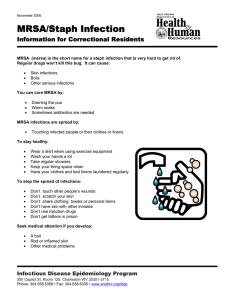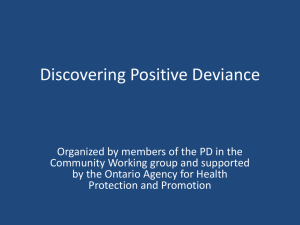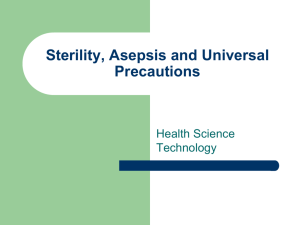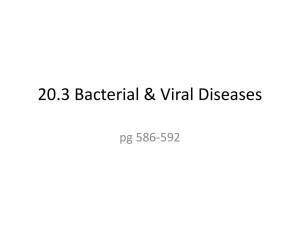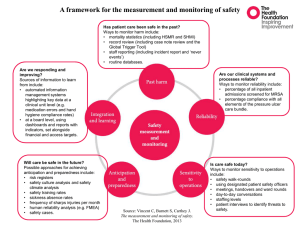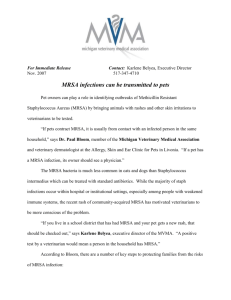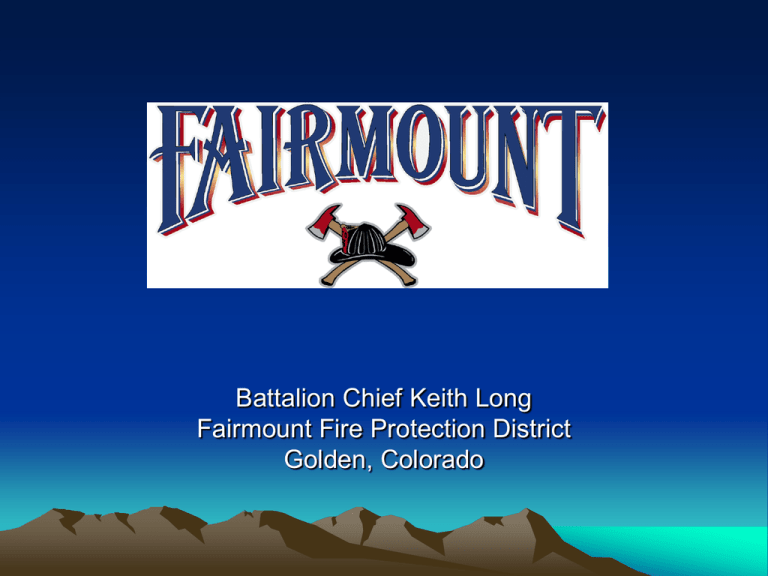
Battalion Chief Keith Long
Fairmount Fire Protection District
Golden, Colorado
Who is this Guy?
Our Journey
• Perception vs. Reality
• Our Mission has
Changed
• Situational
Awareness
• Infectious Disease
• MRSA
• Where do we go from
here?
Perception vs. Reality
• Finished files are the result of years of
scientific study combined with years of
experience.
How many letter “F”s in previous
slide
•
•
•
•
3?
4?
5?
6?
Character
“The ultimate measure of a person is not
where they stand in moments of conflict
and convenience, but where they stand in
times of challenge and controversy”
MLK
C
Copyright Silva, Sweden, all rights
reserved
Then
• Wildfire
• Wildfire
• Wildfire
Our Mission is Changed
•
•
•
•
•
•
•
•
•
Wildfires
Hurricanes
Tornados
Earthquakes
WMD
911
Snow Storms
Pandemics and Epidemics
Etc
Infectious Disease
•
•
•
•
•
Foodborne
Waterborne
Airborne
Bloodborne
Zoonotic/Vectorborne
Pathogens Transmitted in Camp
• We will be specifically talking about
strategies for containing pathogen
potential spread person to person.
Transmission Modes
• Respiratory – e.g. influenza
• Direct Contact – e.g. Staph Infections
• Contaminated Environments - e.g.
Norovirus
Questions?
• How many of you folks are on Teams?
• How many of your teams have Emergency
Response Plans?
• When did you last practice the Plan?
• How many of your Teams have Infectious
Response Plans?
• Have you ever practiced the Plan?
IDRP/ERP for IAP
•
•
•
•
•
•
Position Checklist – Field Organization
Division/ Group Supervisor
Medical Group Supervisor
Triage Unit Leader
Treatment Unit Leader
Transportation Unit Leader
Four Routes of Entry
•
•
•
•
Inhalation
Ingestion
Absorption
injection
Its too late to duck!
Preparation
• N95 Masks for all members
*Must be fit tested*
• Safety Glasses
• Exam Gloves
• Hand Sanitizer
Masks and Respirators
• N95 Mask or
Respirator (goes
on you)
Surgical Mask (goes on them)
Resources
•
•
•
•
Local Health Department
Local clinic or Hospital
State Health Department
Center for Disease Control
Specific
• MRSA – Methicillin – Resistant
Staphylococcus Aureus
MRSA
•
•
•
•
Background
Signs and Symptoms
Incubation Period
Treatments
MRSA and Firefighters
• Methicillin Resistant Staph Aureus is a
Staff infection that is resistant to normal
antibiotic treatments.
• It exists on the skin and in nasal passages
and is “colonized” in 20 to 30% of all
people with no symptoms
MRSA and Firefighters
• The Centers for disease control estimates
that by 2015, all of us will carry some form
of MRSA.
• It used to be solely a hospital problem but
is now found in the community.
• MRSA can survive on some surfaces for
up to 2 months.
MRSA and Firefighters
• Why Fire Fighters?
• FF’s move through the community, hospitals and patient environs
more that the general public.
• Combined living/working environment
• High potential for skin irritation/lacerations
• Do not regard small injuries as a threat.
• Why be concerned?
• If MRSA enters the bloodstream it can cause death or damage that
makes you disabled.
• Most MRSA treatments average cost to treat is between $15000.00
and $20000.00.
MRSA and Firefighters
THIS IS NOT A NEW PROBLEM
FOR FIRE FIGHTERS
It is a problem in many fire stations, fire
crews and at least one case of MRSA has
been found in every state across the
nation.
MRSA and Firefighters
• It starts as a pimple with red tender edges.
• What does it look like?
MRSA and Firefighters
• Progresses into an abscessed infection
quickly.
• If it enters the bloodstream it is hard to
treat. – Only two antibiotics can cure it
then.
• Can result in Fever, Malaise,
Hospitalization and lost work time.
MRSA and Firefighters
• Almost all MRSA can be treated by
drainage of pus with or without antibiotics.
• If antibiotics are used, a sample must be
analyzed first to determine the strain and
type of antibiotics to use.
• Open skin wounds must be covered and
dry. Do not use ointments for treatment
of MRSA.
• Regard breaks in skin as potentially
serious issues
MRSA and Firefighters
• What can we do?
• MRSA cannot live if there is not moisture. Dry PPE,
shirts and pants after use.
• Make new bleach solutions everyday… Needs a ten
minute contact time to be 100% effective.
• Use alcohol cleaners with at least 70% alcohol.
• Cover any skin irritations or lesions with a dry bandaid.
• Don’t wear the same clothes consecutive days when
sweating a lot.
MRSA and Firefighters
• What can we do cont.
•
WASH YOUR HANDS, FACE and ARMS
»
Wear Gloves and PPE
&
• CLEAN! CLEAN ! CLEAN!
Alcohol Based Hand Sanitizers
• What about alcohol based hand sanitizers!
A Gift from the NLW
• Myclyns – immediately after contact with
– Blood
– Saliva
– Vomit
– Coughing
– Feces
– Open wounds
Myclyns
• Kills 50 pathogenic bacteria upon contact
99.99%
• MRSA
• TB
• Hep A, B, and C
• H1N1
• Hepatitus
ExtendaClyns
•
•
•
•
•
Hand Sanitizer
Non Alcohol based
Broad Spectrum
Last up to 4 hours
Kills 99.99% of germs
Leadership Development In High
Risk Environments
•
•
•
•
Training
Field Experience
Self Development
Exercises
Fireline Leadership Challenge
•
•
•
•
•
•
•
Time Pressure
High Stakes
Inadequate Information
Ambiguous Objectives
Poorly Defined Procedures
Rapidly Changing Conditions
Requirement of Team Coordination
Train as you fight, fight as you train
Cognitive Memory System
•
•
•
•
Complex and connects memories together
Well integrated
Treats information neutrally
Subject to control and filtering
•
•
•
•
•
Emotion & Fear Memory
System
Responsible for special emphasis
Stimulus-driven
Direct and quick
Highly emotional, inflexible, and fragmentary
Connected directly to fear responses
Are we setting ourselves up for
failure?
• Wildland vs. Structure vs. All Risk
• Emergency Response Plans Incident
within an incident
• Infectious Disease Response Plans
Lessons Learned
• 95% of illness comes from inadequate
washing of Hands, Sleeping in Dirty
Clothes
• Incident Emergency Medical Task Group
Ideas and Suggestions
• Medical Unit Leaders utilize Isuite Injury/
Illness section.
• Brief your folks, Give Expectations
• Have your people do evaluations on you
6 Priorities in Fire Camp
1.
2.
3.
4.
5.
6.
Case Isolation or cohorting
Personal Hygiene
Environmental Sanitation
Crowding
Education and Awareness
Pre-deployment Interventions
Copyright 1995, Universal Studios, all
rights reserved
Final Thoughts
• I don’t have all the answers, Hopefully I
never will. When I do it’s time for me to
leave. Empower your people. Mentor your
people. Utilize SME (subject matter
experts)
• Thank you for all you do!

